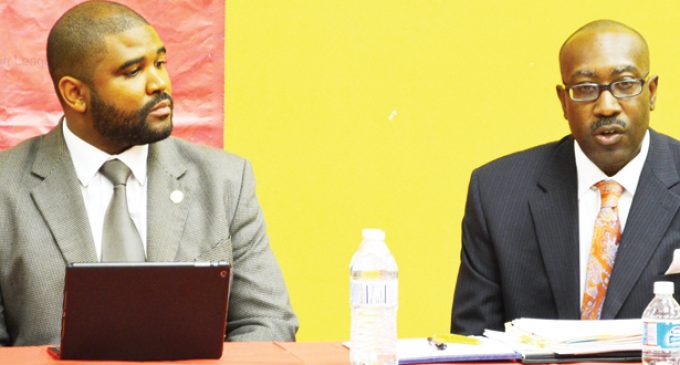UL Young Professionals engage police chief, Council Member in dialogue

(Above: Photos by Chanel Davis- Chief Barry Rountree (right) speaks.)
The Winston-Salem Urban League Young Professionals hosted a forum Friday, Jan. 16, where about 25 attendees got a glimpse into the decisions that law enforcement officers make every day.
The YPs, as the group is called, called the forum to address the issues raised by the police-inflicted deaths Eric Gardner, Mike Brown and others. The forum also served as a membership drive and a salute to Dr. Martin Luther King Jr.
Police Chief Barry D. Rountree, City Council Member James Taylor, chair of the Public Safety Committee, and Don Williams, interim president and CEO of the local Urban League, were the panelists. YPs member Brian Anthony moderated.
Rountree talked about how officers are trained to deescalate situations and determine which level of force is required. He laid out how residents can file complaints against officers if they feel they have mistreated and detailed his department’s new body cameras, which allow officers to record all of their job-related interactions.
An attendee asked the chief how should the public respond when pulled over or approached by an officer who is unprofessional or rude.
“From a personal standpoint, I recommend that you remain as calm as possible. Get the situation over with and go through the complaint process,” he said. “Try to follow the reasonable instructions, and keep your hands visible, don’t be reaching in the glove compartment or under the seat.”
Racial profiling was another topic raised.
Taylor said that while racial profiling remains an issue across the nation, the city has taken precautions to make sure it doesn’t thrive here. The Police Department was pushed to make changes to its license checkpoint procedures after the ACLU threatened to file suit after it said it found clear evidence that cops were targeting Hispanic drivers. The city agreed to several changes, including making it mandatory that supervisors sign off on all checkpoints and that all of them be videotaped.
YPs member Kismet Loftin-Bell brought her 15-year-old son Kenan to the forum because she said that it’s important for him to have a non-hostile relationship with police.
“It’s important for a black male in America to know police officers in a positive light,” she said. “I appreciate the information particularly what the Winston-Salem Police Department has already done (and) what they are doing.”
Taylor said making the police force more racially diverse has also been a longterm goal. The department is always looking to minorities to recruit and has a scholarship set at HBCUs across the state that will pay for a student’s junior and senior year if they agree to become a Winston-Salem cop.
Taylor says there is still much work to be done to make the police force reflective of the city, which is roughly 51 percent white, 34 percent black and 15 percent Hispanic. The Police Department, on the other hand, is 77 percent white, 18 percent black and 5 percent Hispanic.
“I have attended every police recruitment graduation over the last five years and have seen more diversity and minorities in those recruiting classes than ever before,” Taylor said. “We haven’t quite hit our mark but we have been extremely progressive.”
Williams, who has experience in the corporate diversity arena, said that the public will never be able to mirror its community in organizations like the police department without the proper training.
“Being a police officer is a skilled occupation. If we don’t have people in the community that have those skills, then you will not mirror the community. I do commend the department for increasing those numbers, though,” he said.
Rountree also told the attendees that the community has a responsibility as well. He charged them with figuring out what the community needs to do to work better with the police.
“We have these forums all the time. You have some responsibility also,” he said. “We need the communities to help to solve crimes. We come in and out but the citizens are there 24/7. They know what’s going on. This is a two-way street.”
Kimya N. Dennis, assistant professor and coordinator of Criminal Studies at Salem College, said that she feels Chief Rountree is extremely passionate about making a connection with the community.
“He wants to dispel some myths, stereotypes and some rumors about law enforcement officers. I also took from it that the people who attended are interested in bridging that gap between them and law enforcement,” she said. “This (the panel) is going to be an ongoing process that needs to happen more frequently.”













